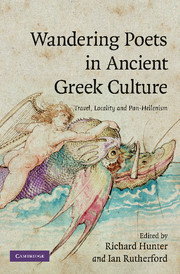Book contents
- Frontmatter
- Contents
- List of figures
- Notes on contributors
- Acknowledgements
- List of abbreviations
- 1 Introduction
- 2 Hittite and Greek perspectives on travelling poets, texts and festivals
- 3 Thamyris the Thracian: the archetypal wandering poet?
- 4 Read on arrival
- 5 Wandering poets, archaic style
- 6 Defining local identities in Greek lyric poetry
- 7 Wandering poetry, ‘travelling’ music: Timotheus' muse and some case-studies of shifting cultural identities
- 8 Epigrammatic contests, poeti vaganti and local history
- 9 World travellers: the associations of Artists of Dionysus
- 10 Aristodama and the Aetolians: an itinerant poetess and her agenda
- 11 Travelling memories in the Hellenistic world
- Bibliography
- Index
6 - Defining local identities in Greek lyric poetry
Published online by Cambridge University Press: 04 July 2009
- Frontmatter
- Contents
- List of figures
- Notes on contributors
- Acknowledgements
- List of abbreviations
- 1 Introduction
- 2 Hittite and Greek perspectives on travelling poets, texts and festivals
- 3 Thamyris the Thracian: the archetypal wandering poet?
- 4 Read on arrival
- 5 Wandering poets, archaic style
- 6 Defining local identities in Greek lyric poetry
- 7 Wandering poetry, ‘travelling’ music: Timotheus' muse and some case-studies of shifting cultural identities
- 8 Epigrammatic contests, poeti vaganti and local history
- 9 World travellers: the associations of Artists of Dionysus
- 10 Aristodama and the Aetolians: an itinerant poetess and her agenda
- 11 Travelling memories in the Hellenistic world
- Bibliography
- Index
Summary
The formative period of the Greek poleis overlaps with the earliest phase of the development of archaic lyric poetry. The two phenomena are not unrelated, as both the sympotic songs of solo lyric and public choral songs were among the most effective media used for negotiating the position of individuals and groups within the community, and for staging shared identities. Poetic discourse in the context of public festivals and other social gatherings was a privileged occasion for parading, reinforcing and redefining collective local identities and, strange as it may seem at first sight, in this process a very important rôle was played by itinerant and/or foreign poets: the construction of a local identity was in fact often voiced through the articulation of a foreign poet. I hope that the following exploration of some case studies of public poetic discourse as a means for defining and promoting civic identities in the archaic and classical periods, and of the different strategies by which such a poetic communal self-definition was constructed, may help us to shed some light also on this aspect of the issue.
A SONG WITHOUT A CITY: EUMELUS' DELIAN PROSODION FOR THE MESSENIANS
One of the most impressive examples of a song being crucial for defining civic identity is provided by what purports to be the most ancient preserved quotation of Greek choral lyric, or, indeed, of Greek poetry tout court.
- Type
- Chapter
- Information
- Wandering Poets in Ancient Greek CultureTravel, Locality and Pan-Hellenism, pp. 137 - 167Publisher: Cambridge University PressPrint publication year: 2009
- 11
- Cited by

